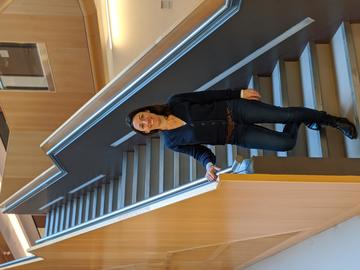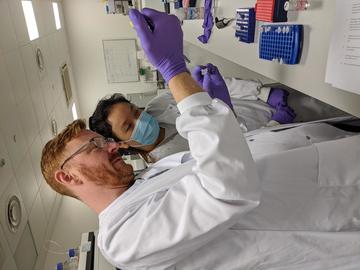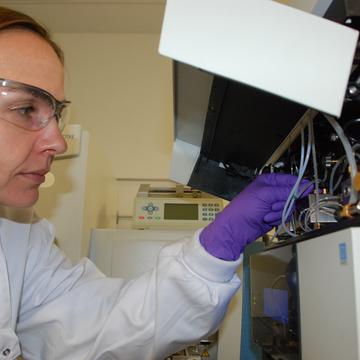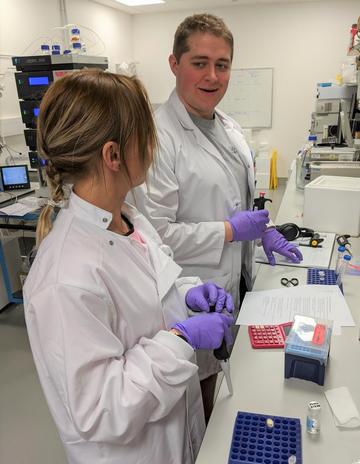Life in the Department of Biochemistry: Advanced Proteomics Facility
The Department of Biochemistry has six fully operational Small Research Facilities that colleagues across the Medical Sciences Division can access to assist their research. To find out more about what these facilities can offer researchers across the University, we spoke to Dr. Marjorie Fournier, the manager of the Advanced Proteomics Facility here in the Department of Biochemistry.
Tell us a little about Advanced Proteomics Facility in the Biochemistry Department.
The Advanced Proteomics Facility (APF) is based in the Department of Biochemistry of Oxford University in the Science area of central Oxford, and supports research and training activities in the field of mass spectrometry-based proteomics.
The facility is equipped with nano-liquid chromatography systems coupled with tandem mass spectrometers (LC-MS/MS), enabling comprehensive analysis of proteins in biological samples to elucidate molecular mechanisms governing cellular processes.
Our facility is run by a team of expert scientists to support researchers from academia and industry on multidisciplinary research projects. We operate on a service and collaboration basis offering research support and training courses covering all aspects of a proteomics analysis, from experimental design to sample preparation, mass spectrometry analysis and bioinformatics analysis.

Image 1: Dr. Marjorie Fournier, manager of the Advanced Proteomics Facility
Tell us a little about your role in the facility?
My role as the manager of the Advanced Proteomics Facility is, with the help of the proteomics team, to ensure high instrument performance, maintain cutting-edge proteomics technologies through methods development, manage the finances of the facility, secure funding for instrument upgrade and research projects, communicate about our facility activity through participation in conferences, seminars and publications in peer-reviewed journals, and train our scientific community.
Our mission is to provide high quality and meaningful proteomics data in a timely and cost-effective manner, and to train specialised and non-specialised scientists in the field of mass spectrometry-based proteomics.
What are the capabilities of the facility?
The facility supports comprehensive proteomics applications from protein identification of complex biological samples to quantification and post-translational modifications analysis for functional proteomics analysis.
Typical projects aim to identify protein contaminants from protein purification, map protein-protein interaction or post-translational modifications on organelles or cellular proteomes, or identify protein abundance changes in cells or tissues in response to environmental changes (drug treatment, disease conditions, etc…). We also support structural proteomics analysis using cross-linking mass spectrometry, currently in high demand with the development of cryo-EM techniques.
Our facility is constantly evolving methods and applications through research activity. We also provide training to the next generation of researchers and give direct access to the instrument for our regular users. This gives a unique opportunity to learn about mass spectrometry techniques and instrument operations.

Image 2: Dr. Carl Morrow training Linda (Yuanlin) Xu during a training session in the APF
Why would our staff want to use the facility?
Our facility is run by a team of highly qualified researchers, specialised in the field of mass spectrometry-based proteomics. Our biological knowledge is key to understanding the biological questions of our researchers, to identify the most suitable proteomics methods, and for data interpretation.
We aim to provide the best possible proteomics service to meet research projects requirements in a timely and cost-effective manner. We are based in the Science area of central Oxford which is convenient for facility access and communication with users.

Image 3: Dr. Aygul Malone, Research Associate in the Advanced Proteomics Facility
Is there equipment available there that staff wouldn't find elsewhere?
We are equipped with two types of nano-LC systems, Easy-nLC 1000 and Ultimate RSLC 3000, which can perform mono and multidimensional peptide separations. The nano-LCs are coupled in-line with three different types of mass spectrometers: an LTQ XL for sample quality check; three Qexactives (Orbitrap) which are the most sensitive instruments used for proteomics analyses of complex samples; and an Orbitrap Elite offering diverse fragmentations capacity (ETD, HCD) useful for PTMs mapping of complex samples.
Our proteomics data analysis suite is equipped with diverse software, MaxQuant/Perseus and Sequest/Proteome Discoverer for protein identification and quantification; PEAKS for de novo sequencing and post-translational modification analysis; Skyline and Pinpoint for targeted quantitation and Progenesis for label-free quantification; pLink for cross-linking mass spectrometry data analysis. We use R for statistical analysis and other online available software for functional annotation analysis.

Image 4: Dr. Aygul Malone training Daniel Molland, a Biochemistry DPhil student
Are there any collaborations/partnerships you'd like to pursue with colleagues in Oxford at the facility?
The APF is currently working with around ninety users from thirteen different departments across Oxford University including, Biochemistry, Dunn School of Pathology, Chemistry, Physiology, Pharmacology, Plant Sciences, Earth Sciences, WIMM, Pediatrics, Welcome Center of Human Genetics, NDCN, NDM and STRUBI. We cover multidisciplinary exciting research projects from very diverse scientific areas in cellular and molecular biology to medicine and earth sciences.
Where is the facility? How can someone book in to use the facility?
Activities of the APF are accessible at our facility website https://www.bioch.ox.ac.uk/advanced-proteomics-facility . Please contact marjorie.fournier@bioch.ox.ac.uk for facility access and discussion of proteomics projects. We also provide quotations for grant applications.

Image 5: A view of the Advanced Proteomics Facility




